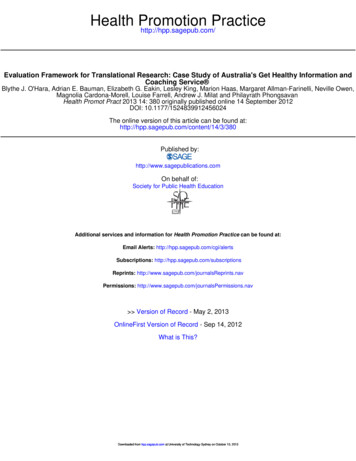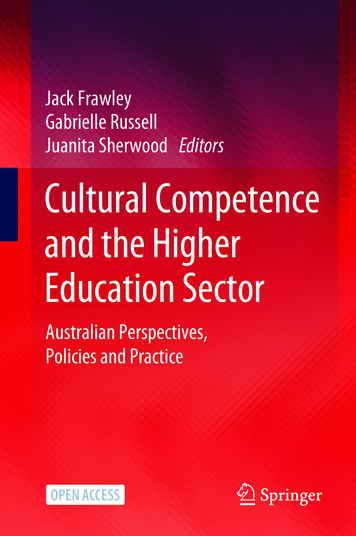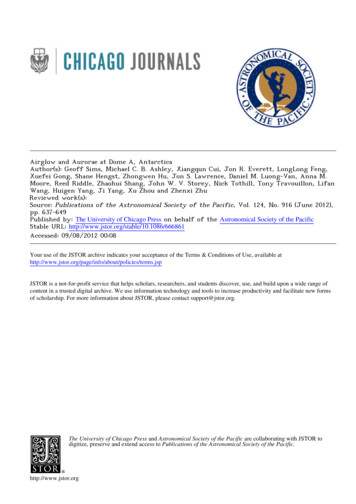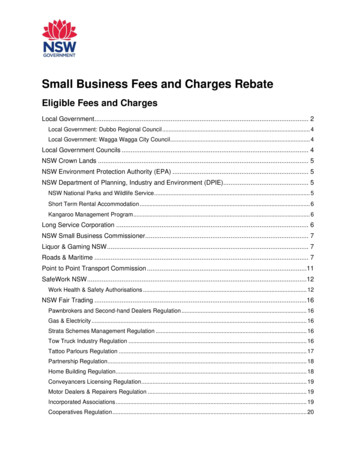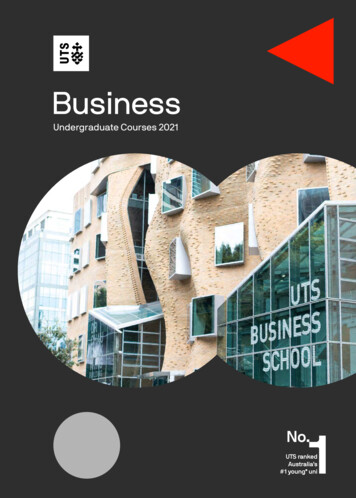
Transcription
BusinessUndergraduate Courses 20211No.UTS rankedAustralia’s#1 young uni
Welcome toUTS Business SchoolContentsFaculty snapshot02Why business at UTS?10,63504Australia’s most innovative campus7417 undergraduate06Our degrees and specialisations3312 postgraduate course work09 Courses09 Bachelor of Businesstotal students3312 higher degree researchUTS at a glance (2019)46,159students15,450international studentsBachelor of Economics33,752undergraduate studentsBachelor of Management10,208postgraduate coursework2199higher degree research students4174staff12Majors202224Majors26Bachelor of Accounting Co-op Scholarship program28 Combined degreesUTS student diversity49%female students28 Bachelor of Business, Bachelor of Creative Intelligenceand Innovation51%male students29%are 25 or older29 Bachelor of Management, Bachelor of Creative Intelligenceand Innovation49% also speak a languageother than English30Bachelor of Laws, Bachelor of Business30Bachelor of Laws, Bachelor of Economics30 Bachelor of Science in Information Technology,Bachelor of Business32 Bachelor of Engineering (Honours), Bachelor of BusinessPlease note the above numbers are approximate asof November 2019.Connect with us32Bachelor of Information Systems, Bachelor of Business32Bachelor of Science, Bachelor of BusinessUTS Business33Bachelor of Medical Science, Bachelor of BusinessUTS Business33Bachelor of Biotechnology, Bachelor of Business34International Studies35Global Exchange36 Degree add-ons38 What you need to know38Applying to UTS40Year 12 subject scheme41Contact usUTS BusinessAcknowledgement of CountryUTS acknowledges the Gadigal People of the EoraNation and the Boorooberongal People of the DharugNation upon whose ancestral lands our campusesstand. We would also like to pay respect to the Eldersboth past and present, acknowledging them as thetraditional custodians of knowledge for these Lands.1
Why businessat UTS?More than just a business schoolREADY FOR TOMORROW, TODAYCONNECTIONS THAT COUNTGOODBYE, COMFORT ZONETomorrow’s business challenges? They’rebig. Complex. Undefined. Learn to thinkdifferently with a degree that respondsto the changing business landscape –and to the disruption that’s shaping theworkforce of the future.What you know is important, and whoyou know is as well. At UTS, we’ll get you inthe room with the future-makers ofthe business world. Engage withinternships, lectures and networking,and build relationships with top-tierprofessionals from leading Australian andinternational companies.Take advantage of exchange and studyabroad opportunities, global leadershipprograms, international internships andvolunteering placements. Or, pair yourbusiness qualification with the Bachelorof Arts in International Studies, whichincludes a built-in year of overseas study.ON TOP OF THE WORLDInternships, industry-focused capstonesubjects, professional work placements– at UTS, these hands-on experiences arekey to all our degrees. Put your knowledgeinto action and get real-world know-howfrom early in your degree. The upshot?You’ll be ready for anything the workforcethrows at you.AT THE HEART OF THE ACTIONLearn where business happens. Thanks toour Sydney city location, we’re surroundedby Australia’s creative, start-up andtechnology industries – and by leadinginternational companies like PWC,Ernst & Young and the CommonwealthBank of Australia.2To be your best, you need to learn from thebest. UTS Business School is one of onlya handful of business schools in the worldto be accredited by The Association toAdvance Collegiate Schools of Business(AACSB). This means we’ve attained thehighest standard of achievement forbusiness schools worldwide, so you’ll begetting a globally recognised qualification.A PRACTICAL ADVANTAGE
UTS snapshotTechnology. Entrepreneurship. Sustainability. Social justice.At UTS, we’re building a collaborative future, one student at a time.5-star rankingOver 40,000200,000 in Employability, Facilities,Inclusiveness, Innovation,Internationalisation and Researchstudents enrolledin 2019alumni in132 countries(QS Stars Rating System 2018 – 2021)5180 85%#5 in Australiaundergraduate degreesof undergraduate studentsundertake internships(or similar experiences)as part of their coursefor graduate outcomes(92.5% of students employedfull-time three years after graduation)#69 in the world100%160 for graduate employabilityof UTS research benchmarkedat world standard or aboveclubs and societieson campus(QS Graduate Employability Rankings 2020)(2019 Graduate OutcomesSurvey – Longitudinal)(2018 Excellence in Research forAustralia evaluation)3
Aus tralia’s mostinnovativecampusSay hello to iconic buildings, purpose-builtlearning spaces and a wealth of socialspaces where you can relax and connect– the UTS Campus has been designed withyou in mind. It’s interconnected. Embeddedwith technology. Built for students. It’s theresult of a billion-dollar investment in thefuture of learning.JOIN THE IDEAS HUBA world-class degree deserves aworld-class environment – so as a UTSBusiness student, you’ll have access tothe only Frank Gehry-designed buildingin Australia. Called the Dr Chau ChakWing Building, the layout of this uniqueurban treehouse challenges traditionalapproaches to business education,just like our courses do.CONNECT.COLLABORATE. INNOVATE.Our Haymarket facilities are allabout getting – and keeping – youconnected. They’re full of flexiblelearning environments, collaborativestudy spaces, and informal and socialhubs where you can get together withyour peers. And they’re fitted out withthe latest technologies – think plasmadisplays, smart whiteboards and laptopconnectivity – so you can track yourbrainstorming sessions as they happen.4
5
Undergraduate Courses 2020Our degrees andspecialisationsThere’s more than one way to conquer the businessworld. Choosing your degree is the first step.BACHELOR OF BUSINESSBACHELOR OF MANAGEMENTWHO’S IT FOR?WHO’S IT FOR?Future practitioners who want to make an impact across thewhole range of business fields, sectors and industriesNatural leaders with a taste for digital creative enterprises andthe events, sport and tourism industriesWHY’S IT UNIQUE?WHY’S IT UNIQUE?– It’s real-world: Our Integrated Business Perspectives subjectwill challenge you to see how business fits together– It’s innovative: Learn how to identify and develop newbusiness opportunities with the Business Design andInnovation stream– It’s flexible: Customise your course structure and choosefrom 10 majors, 30 sub-majors, and 4 extended majorsSPECIALISE IN:– Accounting– Advertising and Marketing Communications– Economics– Finance– Human Resource Management– International Business– Management– Marketing– Business Law (2nd major only)– Information Technology (2nd major only)COMBINE IT WITH – Arts in International Studies– Biotechnology– Creative Intelligence and Innovation– Engineering– Information Systems– Information Technology– Medical Science– Laws– Science6– It’s creative: Our new major in Digital Creative Enterprise isall about creative intelligence and transdisciplinary practice– It’s hands-on: Put your specialist knowledge into practicewith a compulsory industry internshipSPECIALISE IN:– Digital Creative Enterprise– Events– Sport Business– TourismCOMBINE IT WITH – Arts in International Studies– Creative Intelligence and Innovation(not available with a major in Digital Creative Enterprise)
UTS Business SchoolBACHELOR OF ECONOMICSBACHELOR OF ACCOUNTINGWHO’S IT FOR?WHO’S IT FOR?Critical and analytical thinkers who want specialist skills ineconomics, econometrics and market designHigh achievers with a head for numbers, an eye for detail and apassion for business and analysis.WHY’S IT UNIQUE?WHY’S IT UNIQUE?– It’s one of a kind: This is the only Economics degree whereyou can study market design– It’s lucrative: Land an industry scholarship valued at upto 51,500– It’s in-depth: Study 11 core subjects in economics andchoose 3 additional economics electives– It’s practice-based: Pursue 2 x 6-month professionalinternships with leading industry organisationsSPECIALISE IN:– It’s personalised: Study with a small cohort of up to35 studentsEconomics, plus second major in:– Advertising and Marketing Communications– Business Law– Finance– Human Resource Management– Information Technology– ManagementSPECIALISE IN:Accounting, plus second major as per Bachelor ofBusiness optionsCOMBINE IT WITH The Bachelor of Accounting cannot be combinedwith anything.– MarketingCOMBINE IT WITH – Laws7
8
BusinessBachelor of BusinessWHAT’S IT ALL ABOUT?2020 Selection rank*: 87.00 (full-time)91.70 (part-time)Duration: 3 years (full-time)6 years (part-time)UAC Code: 601030 (full-time)601035 (part-time)CRICOS code:006487ACombine this degree with: Creative Intelligence andInnovation, InternationalStudies, Law, IT, Engineering,Medical Science, Science,Biotechnology, InformationSystemsSee pages 28-34Lead, don’t follow. With the Bachelor of Business, you’ll be ready tomake your mark on the global business landscape. Get your headaround fundamental business concepts and build specialist skillsthrough your major, extended major, sub-major or elective choices.HERE’S WHAT’S ON OFFER– A degree that’s tailored to your personal passions: Use thefirst year to explore key business disciplines, and then startbuilding specialist skills in years 2 and 3. Take charge of yourcourse structure and your major(s) to build a qualification thatprepares you for your dream career– Choice, choice and more choice: There are 10 majors,more than 30 sub-majors, and four extended majors onoffer in this course – and they span almost every businesstopic imaginable.– Hands-on study: Every major includes a capstone subjectwhere you’ll take what you’ve learned in the classroom andapply it to a real-life project or business problem. There’s nobetter way to see your expertise come to lifeBUSINESS INTERNSHIPAt UTS, we’re all about taking what we know and putting it to work– and there’s no better way to do it than with an internship. TheBusiness Internship subject gives you the opportunity to complete210 hours of approved work experience that relates directly toyour major. It’s available in your second or third year of the degreeif you’re studying one of the following majors:– Economics and Extended Economics– Finance and Extended Finance– Management and Extended Management– Marketing and Extended Marketing– International BusinessStudents who are completing all other business majors, whichinclude a compulsory set of 8 subjects, may still be able to do aninternship as a free elective.* Selection ranks: published ranks indicate the lowest selection rank (ATAR plus any adjustment points applied through eligible admissions schemes) towhich an offer was made to a domestic Current School Leaver (Year 12) in the Autumn 2020 intake (for December Round 2 and January Round 1).9
Undergraduate Courses 2020HERE’S HOW IT WORKSSECOND MAJORThere are lots of different ways to complete the Bachelor ofBusiness (see table, right). In your first year, you’ll start with coresubjects that span all the major business disciplines, giving you asolid grounding in key business concepts. After that, you’ll start tospecialise by choosing:Choose from one of the first majors plus:– two majors, orExtended majors give you the chance to deep dive into a singlebusiness discipline. You’ll study 12 subjects (rather than the 8subjects in a standard major) and emerge with highly specialisedskills in your chosen area of study.– a major plus two sub-majors, or– a major, one sub-major, plus electives, or– an extended major plus one sub-major, or– an extended major plus electivesFIRST MAJOR– Accounting– Economics– Finance– Business Law or– Information TechnologyEXTENDED MAJORSThere are four extended majors to choose from:– Extended Economics– Extended Finance– Extended Management– Extended Marketing– Human Resource ManagementELECTIVES– International BusinessIn some degree configurations, you’ll have the choice of 4electives. Consolidate your expertise with additional businesssubjects, or expand your interests by enrolling in subjects fromother university faculties.– Management– Marketing– Advertising and Marketing Communications10
BusinessBachelor of BusinessTypical course structureYear 1Year 2Year 3Accounting for Business Decisions AMajor Subject 1Major Subject 5Business StatisticsMajor Subject 2Major Subject 6Economics for BusinessOPTIONOPTIONIntegrating Business PerspectivesOPTIONOPTIONAccounting for Business Decisions BMajor Subject 3Major Subject 7Fundamentals of Business FinanceMajor Subject 4Major Subject 8 (Capstone)Managing People and OrganisationsOPTIONOPTIONMarketing FoundationsOPTIONOPTIONAutumn sessionSpring sessionNote: A normal full-time study load is four subjects per session. Your study plan may differ if you do less subjects or if you undertake subjects over summerThis structure is indicative only.5 options to finish your degreeOption 1Option 2Option 3Option 4Option 52nd Major (8 subjects)2 Sub-majors(4 subjects each)1 Sub-major(4 subjects) and4 Elective subjectsExtended Major(4 additional subjects)and 1 Sub-major(4 subjects)Extended Major(4 additional subjects)and 4 Elective subjectsNote: Structure will differfrom above sequenceNote: Structure will differfrom above sequenceSUB MAJORS– International Business Studies (Global Exchange)– Accounting in Practice– International Management– Advanced Advertising– International Studies– Advertising– Language other than English– Business Analytics in Marketing– Management Consulting– Business Information Systems– Management– Business Innovation and Financial Management– Marketing– Business Law– Mathematics– Econometrics– Quantitative Management– Economics– Specialist Country Studies– Event Management– Sport Management– Finance– Statistics– Financial Reporting– Strategic Marketing– Financial Services– Sustainable Enterprise– Human Resource Management– Taxation Law– Information Technology– Tourism ManagementPlease note this course is under review in 2020. Subjects and sequence may differ from those listed.11
Undergraduate Courses 2020MajorsAccountingEconomicsAccounting – it’s the language of business. This major is allabout financial transactions, and how those transactionscontribute to effective decision-making processes at seniororganisational levels. It also satisfies the requirements foraccreditation by Chartered Accountants Australia andNew Zealand and CPA Australia.Business is built on the economy, so understanding thisrelationship is a critical component of effective business practice.With this major, you’ll build expertise in the analytical tools,empirical analyses and laboratory methods of contemporaryeconomics, and learn to apply what you know to business policyand practice.SUBJECT LISTSUBJECT LIST– Accounting for Business Combinations– Economics for Business 2– Cost Management Systems– Intermediate Microeconomics– Accounting Standards and Regulations– Intermediate Macroeconomics– Applied Company Law– Introductory Econometrics– Assurance Services and Audit– The Global Economy (Capstone)– Taxation LawPlus 3 subjects from the following:– Management Decisions and Control– Financial Statement Analysis (Capstone)PROFESSIONAL BODIES AND ASSOCIATIONSWe are an accredited tertiary course of CharteredAccountants of Australia and New Zealand, CPA Australia andthe Chartered Institute of Management Accountants.– Applied Microeconometrics– Behavioural Economics– Business Internship– Economic Growth and Development– Economics of Competition and Strategy– Economics of Money and FinanceCAREER OPTIONSGraduate positions: Graduate Accountant, Analyst,Services Accountant, Tax Accountant, Auditing JuniorCareer progression: Financial Controller, Senior Accountant,Business Manager, Chief Financial Officer (CFO),Finance Manager, Senior Tax Specialist, Auditor, AccountingFirm Partner– Economics of the Environment– Game Theory– Labour Economics– Market Design– Mathematics for Economics and Business– Public EconomicsCAREER OPTIONSGraduate positions: Member of Economic Consulting Team,Data Analyst, Statistician, Economic Markets Report Writer,Policy Analyst, Market Analyst/Researcher, Economist in a varietyof sectorsRachel PowerBachelor of Business (Honours)Majors: Accounting and EconomicsGraduate Economist, DeloitteCareer progression: Policymaker, Senior Policy Analyst, EconomicStrategist, Journalist, Econometrician, Economic NaturalResources Manager, Finance Manager, International Trade Analyst,Natural Resource Manager, Academic Economist“I really valued the opportunity to try out a range of different subjectsbefore I chose a specialisation. This meant that I could consider howmy major would relate to the broader business context. I wanted to bechallenged to succeed, to practically apply my studies to real life situationsand to be prepared for work; and I felt that this course would best help meachieve these goals.12My degree, particularly my economics subjects, have taught me thatconflicting ideas in business are not a bad thing, but that they bring lightto complex issues and help move towards long term solutions. Similarly,in accounting subjects, I have learned to make ethical decisions to workthrough conflicts in various business contexts. Understanding thesecomplexities and developing relevant skills is invaluable to me as I enterthe workforce.”
BusinessRianna DarbyFinanceMoney? It makes the world go round. When you major infinance, you’ll take a deep dive into the economic activitiesof the public, private and government sectors, from raisingfunds in financial markets to investment and real and financialassets. You’ll gain critical skills to support prospective infinancial markets and institutions, information technology orconsulting firms that provide financial advice and services.Bachelor of BusinessMajors: Finance and AccountingGlobal Distribution & Business ManagementGraduate, AMP CapitalSUBJECT LIST– The Financial System– Financial Metrics for Decision Making– Investment Analysis– Corporate Finance: Theory and Practice– Applied Financial Decision Making (Capstone)Plus 3 subjects from the following:– Applied Portfolio Management– Business Internship– Commercial Bank Management– Derivative Securities– Ethics in Finance– International Financial Management– Investment Banking– Issues in Corporate Finance– Time Series EconometricsPROFESSIONAL BODIES AND ASSOCIATIONSCFA Institute has partnerships with select universities aroundthe world that have imbedded into their degree programs asignificant percentage (more than 70%) of the CFA ProgramCandidate Body of Knowledge. UTS is a CFA Program Partnerinstitution based on the Bachelor of Business with a major inFinance. Recognition as a partner signals that the degree’scurriculum is closely tied to professional practice and is wellsuited to students preparing to sit for the CFA examinations.“Finance and Accounting were foreign conceptsto me before I began my studies at UTS, but itwas through my first year of the Business degreethat I grew interested in both areas of study.Finance in the business world incorporates somany diverse skills, careers and organisations,so to reflect this, finance students at UTS learnby doing. Our assessments and classes involvedhypothetical business issues, or were based oncurrent problems faced by real companies. Theknowledge learned when solving these issuesis applicable in many careers, ranging fromorganising a profitable portfolio as an investor, toworking in microfinance by helping individuals inemerging markets. No matter the career, Financestudents are equipped with the knowledge andskills that could change how global businessesand societies work.”CAREER OPTIONSGraduate positions: Financial Advisor, Investment Analyst,Corporate Financial Consultant, Banker, Financial Planner,Fund Administrator, Banking Consultant, Pricing AnalystCareer progression: Treasury Manager, Risk Manager, HedgeFund Manager, Superannuation Fund Manager, Stockbroker,Equity Research Analysis13
Undergraduate Courses 2020Bianca AzzopardiHuman ResourceManagement (HRM)Bachelor of BusinessMajors: Human Resource Managementand Business LawGeneral Manager, The Sam Prince GroupWhen it comes to business, there’s no asset more valuablethan people. With a major in HRM, you’ll become an expertin the recruitment, development and retention strategiesthat result in an engaged and effective workforce. Learn thetheory of HRM and employment relations, as well as Australianand international HRM frameworks, and become an effectivemanager who can bring the best out of your team.SUBJECT LIST– Introduction to Human Resource Management– Managing Strategic Performance– Strategic Human Resource Management– Managing Employee Relations– Management Skills– Introduction to Strategy– Understanding Organisations: Theory and Practice– Human Resource Management (Capstone)PROFESSIONAL BODIES AND ASSOCIATIONSThe HRM major is accredited by the Australian HumanResources Institute, the professional association for humanresource professionals.CAREER OPTIONSGraduate positions: Human Resources Officer, PayrollConsultant, Recruitment Consultant, Safety Officer, EmployeeRelations CoordinatorCareer progression: Corporate Advisor, Human ResourcesManager, Human Resources Business Partner, Trades andLabour Manager, Work Health and Safety Manager,Account Manager14“The Capstone subject in the Human ResourceManagement Major was nothing short of a lifechanging experience. I was able to put intopractice not only the theories and practicesI’d learnt within the subject but moreover theknowledge I had gained through the entirety ofmy degree. Upon completion, I was approachedby the Human Resource Manager of Zambrerofor an internship. This four week internship thenresulted in a full-time position withinthe company.”
BusinessMajorsInternational BusinessManagementBusiness is a global concept, so get the practical skills andtheoretical foundations to operate effectively in an internationalbusiness environment. This major looks at the development,strategy and management of multinational organisations, andthe ways in which globalisation impacts individualsand organisations.Strategic thinker? A good manager can plan, delegate, monitor,organise and budget – and with the Management major, youcan too. You’ll become a creative and critical thinker who’sable to engage with staff and organisational challenges in aresponsible, reflexive and accountable manner. You’ll also learnall about the opportunities and challenges of management in anincreasingly complex sector.SUBJECT LIST– Introduction to StrategySUBJECT LIST– Transnational Management– Introduction to Strategy– International Accounting– Understanding Organisations: Theory and Practice– International Marketing– Global Operations and Supply Chain Management– Global Operations and Supply Chain Management– Management Skills– International Business Capstone– Business Ethics and SustainabilityPlus 2 subjects from the following:– Business Internship– Management CapstonePlus 2 subjects from the following:– International Business Transactions and the Law– Business Internship– International Management Field Study*– Innovation and Entrepreneurship– Management Skills– International Management Field Study*– Introduction to Human Resource Management– Introduction to Human Resource ManagementCAREER OPTIONSWith a major in international business, you’ll be ready towork in almost any industry. Opportunities include roles inpublic, private and government sectors, and opportunitiesin international trade administration, corporate/governmentrelations, business intelligence, foreign affairs, internationalmarketing, import/ export, international banking, traveland tourism, international freight, economic development,insurance, foreign exchange, mergers and acquisitions,international aid and logistics management.– Management Consulting– Transnational ManagementCAREER OPTIONSGraduate positions: Supply Chain Management Assistant,Program Coordinator, Property Management Assistant,Business AnalystCareer progression: Management Business Analyst,Compliance Executive, Chief Executive Officer (CEO),Operations Leader, General Manager, Chief Operating Officer(COO), Management and Change Consultant, Owner/Operatorof a small-medium enterprise* Involves overseas travel and incurs expenses in addition to thesubject fee. VISA restrictions may apply to some students dependingupon the country visited.15
Undergraduate Courses 2020Melissa IrwinMarketingBachelor of BusinessMajor: MarketingPartnerships Manager, Australian FootballLeague (AFL)Identify – and create – customer needs and desires.You’ll become an efficient marketer who can define, measureand quantify target markets; communicate effectively withcurrent and prospective clients; and deploy meaningful andresponsive products and services that give people whatthey want.SUBJECT LIST– Consumer Behaviour– Marketing Research– Integrated Marketing Communications– Marketing Planning and Strategy– Applied Project in Marketing (Capstone)Plus 3 subjects from the following:– Branding– Business Internship– Business-to-Business Marketing– Digital Marketing and Social Media– Entrepreneurial Marketing– International Marketing– Marketing Analytics and Decisions– Marketing Channels– Pricing Strategies and Tactics– Product Innovation Marketing– Services MarketingPROFESSIONAL RECOGNITIONWhen you complete the marketing major, you’ll be eligibleto apply for Associate Membership of the AustralianMarketing Institute.CAREER OPTIONSGraduate positions: Marketing Analyst, MarketingCoordinator, Sales and Marketing Assistant, Insight Analyst,Social Media Advisor, Events CoordinatorCareer progression: Marketing Manager, Brand Manager,Service Experience and Quality Manager, Marketing Director,Marketing Executive, Product Manager16“UTS allows you to work on real businesses andcase studies that can be applied to the workforceonce you graduate. When working on advertisingand marketing communications campaigns, I stilluse a briefing template that I was taught while Iwas at uni.The Lecturers and Tutors at UTS were anotherstandout to me. They are industry experts &specialists in their fields, which means you getthe best possible teachers that provide you withchallenges, opportunities and actual scenariosthat are happening in the workplace. Thisdefinitely helped me transition from universitystudy to work.”
BusinessMajorsAdvertising and MarketingCommunicationsLearn to plan and manage promotional campaigns, and toevaluate their outcomes using tried and true market researchtechniques. You’ll also develop hands-on experience in bestpractice approaches to advertising and other forms ofmarketing communication.SUBJECT LIST– Consumer Behaviour– Integrated Marketing Communications– Marketing Research– Media Planning– Advertising Research– Digital Marketing and Social Media– Applied Project in Advertising and MarketingCommunication (Capstone)Plus 1 subject from the following:– Advertising Practice– Advertising StrategiesCAREER OPTIONSGraduate positions: Advertising Officer, MarketingAnalyst, Marketing and Communications Coordinator, Salesand Marketing Assistant, Insight Analyst, Social MediaAdvisor, Events Coordinator, Public Relations Coordinator,Communications OfficerCareer progression: Communications Advisor, MarketingCommunications Specialist, Marketing Manager, PublicRelations Manager, Brand Manager, Service Experience andQuality Manager, Marketing Director, Marketing Executive,Product Manager, Advertising Executive17
Undergraduate Courses 2020Information Technology(Second major)Pair your business expertise with fundamental systems analysisskills with a major in IT. Choose to explore either the technical ormanagement side of business technologies, and get involvedin designing complex business information systems – it doesn’tget more hands-on than that.SUBJECT LIST– Database Principles– Introduction to Information Systems– Programming Fundamentals– Business Requirements ModellingPlus 3 from the following:– Applications Programming– Business Process and IT Strategy– Collaborative Business Processes– Cryptography– Cybersecurity– Data Structures and Algorithms– Database Programming– Fundamentals of Interaction Design– Information System Development Methodologies– Innovations for Global Relationship Management– Networked Enterprise Architecture– Routing and Switching Essentials– Software Architecture– Software Engineering Practice– Systems Testing and Quality Management– Web Systems– Network FundamentalsCAREER OPTIONSGraduate positions: Web Designer, Information ManagementSpecialist, Business Analyst, Software Developer, Programmer,Data AnalystCareer progression: Systems Manager, InformationTechnology Manager, Business Process Modeller,Applications Architect18
BusinessMajorsBusiness Law(Second major)The legal and business sectors are closely intertwined. Studythe law as it governs business activity and gain niche expertisethat’ll set you apart. Students can choose a stream thatexplores the foundations of law or a more business-specificlegal stream with electives in taxation and marketing law.SUBJECT LISTSelect 1 of the following streams:1. Foundations of Law– Contracts– Torts– Introduction to Property and Commercial Law– Foundations of Law– Ethics Law and JusticePlus 2 of the following:– Banking Law– Competition Law– Deceptive Trade Practices and Product Liability– Environmental Law– Insolvency– Introduction to Public International Law– Revenue Law– Sports Law2. Law for Business– Introduction to Law– Industrial and Labour Law– Applied Company Law– Advanced Commercial Law– Competition and Consumer LawPlus 3 of the following:– Advanced Taxation Law– Banking Law– Estate Planning (UG)– Insolvency Administration– Intellectual Property Commercialisation– International Business Transactions and the Law– Marketing Law– Retirement Plann
first year to explore key business disciplines, and then start building specialist skills in years 2 and 3. Take charge of your course structure and your major(s) to build a qualification that prepares you for your dream career - Choice, choice and more choice: There are 10 majors, more than 30 sub-majors, and four extended majors on
